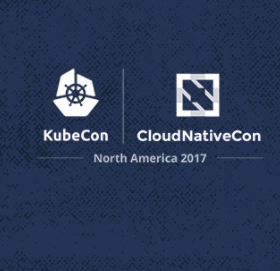
The Cloud Native Computing Foundation kicked off their KubeCon + CloudNativeCon North America conference, dedicated to Kubernetes and cloud native technologies, in Austin, Texas today with the announcement of 31 new members, including AppsCode, CA, Datadog, Grafana Labs, InfluxData, HPE and Kasten.
“KubeCon + CloudNativeCon is the polestar for practitioners of Kubernetes and other cloud native technologies. We are bringing together the core developers, end users, vendors and other contributors who are building the infrastructure for the next decade of computing,” said Dan Kohn, executive director of the Cloud Native Computing Foundation (CNCF).
A number of companies made announcements surrounding Kubernetes and cloud-native technology. Here’s a rundown of the biggest news:
Codefresh announces support for Helm Charts in Kubernetes
The container-native CI/CD platform has announced it is bringing Helm Charts to Kubernetes. With Helm Charts, engineers can define their apps for Kubernetes with microservices and networking components. It will act as a package manager for Kubernetes.
CoreOS Tectonic 1.8 released
CoreOS has announced the latest release of Tectonic will ship with the beta version of Open Cloud Services Catalog for enterprise Kubernetes. Tectonic is the company’s enterprise Kubernetes platform. The new Open Cloud Services are new automated software services that will enable enterprises to deploy key infrastructure components without any cloud vendor lock-in. The services include etcd, Prometheus and Vault.
Other features of 1.8 include the open source Kubernetes version 1.8, Prometheus 2.0, and improved container runtime stability and flexibility.
DriveScale announces support for Kubernetes and Docker
DriveScale will now support Kubernetes and Docker to provide persistent storage for container environments. “If you are running stateful applications, you need stateful storage,” said S.K. Vinod, VP of Product Management at DriveScale. “For DevOps teams running Kubernetes-based environments, DriveScale’s composability platform is the key to providing direct attached storage-like performan
Kasten emerges from stealth
Kasten, a cloud-native data management company, emerged from stealth today with the K10 platform and an open source project called Kanister. With these new solutions Kasten aims reinvent enterprise data management, and help enterprises build, deploy and manage stateful containerized apps at scale.
Kasten K10 is an app-centric data management platform that provides policy-drive automation, compliance monitoring, data protection, and data mobility and manipulation.
Kanister is an extensible framework for application-level data management.
InfluxData announces new Kubernetes and Prometheus functionality
InfluxData is updating its open source platform to provide advanced Kubernetes auto scaling and Prometheus read/write support. In addition, the company recently announced it would be joining the Cloud Native Computing Foundation. “With the introduction of this functionality, InfluxData continues to differentiate itself by providing high precision, high availability metric collection and storage of K8s containers, and fully participating in the Prometheus ecosystem,” said Tim Hall, InfluxData VP of Products. “We are pleased to support these new standardization efforts, which help the industry to focus on features instead of building collectors. This new release also allows our partners to strengthen their container products/services.”
Instana’s AI powered health management solution for Kubernetes
Instana is announcing full-stack monitoring support for Kubernetes-orchestrated applications. The APM solution leverages artificial intelligence to discover, analyze and monitor between different technology stacks. The new Kubernetes support will enable these capabilities to work in-between Kubernetes orchestration layers to provide complete observability of applications.
“Kubernetes is seeing continued adoption, from customers who are digitally transforming and building high speed application development organizations and the industry. We viewed this as an opportunity to create capabilities that could work complementary to, and in unison with such a successful and useful platform,” said Mirko Novakovic, Instana founder and CEO. “We are thrilled to leverage Instana’s solution to augment the Kubernetes platform and provide our customers with full stack monitoring and understanding of dynamic orchestration environments.”
Oracle announces new open source Kubernetes Tools
Oracle is open sourcing the Fn project Kubernetes Installer and Global Multi-Cluster Management solution. These projects are designed for the next generation of container native apps leveraging Kubernetes, according to Oracle. The Fn project Installer brings serverless capabilities to Kubernetes environments. The technical preview of Global Multi-Cluster Management solution provides a set of distributed cluster management features for Kubernetes federation.
“There continue to be significant concerns by developers looking into serverless development that cloud providers are leading them into a lock-in situation and away from industry standards,” said Mark Cavage, vice president of software development at Oracle. “The Oracle Container Native Application Development Platform, along with the new tools introduced today, are built on top of Kubernetes and provide an open source based, community driven, and thus, cloud-neutral, integrated container native technology stack that prevents cloud lock-in while enabling the flexibility of true hybrid and multi-cloud deployments.”
Quantum sees open source support for Rook
Quantum announced its open source project Rook has been getting significant support for the developer community since it was released into open source more than a year ago. Rook provides cloud benefits of cloud infrastructures to public cloud and on-premise environments. It includes self-managing, self-scaling and self healing capabilities as well as deep integration into cloud-native environments.
Weaveworks Cloud Enterprise Edition
Weaveworks announced the availability of Weave Cloud Enterprise Editor for its container-based microservices management platform. New features include: incident management, release automation, rollback for CI/CD, and full stack Kubernetes troubleshooting.
“With this release we are bringing together all of our experience running Weave Cloud, Prometheus and Kubernetes at scale on AWS,” said Alexis Richardson, CEO and co-founder of Weaveworks. “We are sharing all of Weaveworks’ critical infrastructure experiences and know-how with our customers. By integrating monitoring more deeply with deployment and management, we’re helping customers fix problems immediately and ship their development changes incredibly fast. The Enterprise Edition provides history and snapshots ensuring reliability and stability.”






